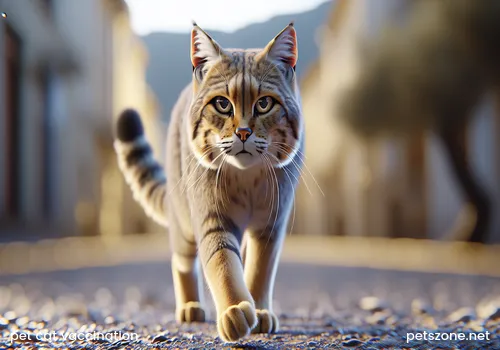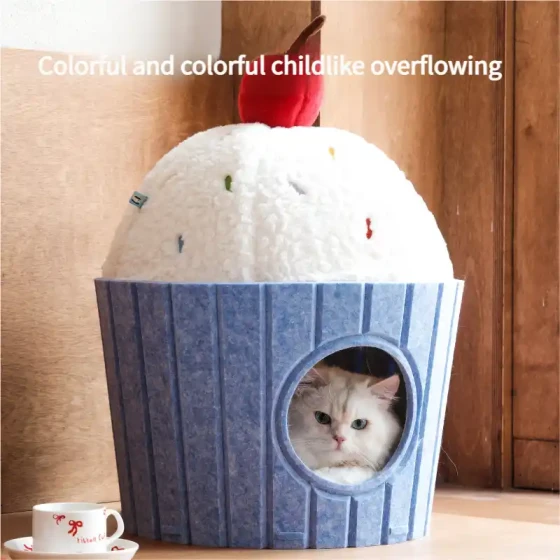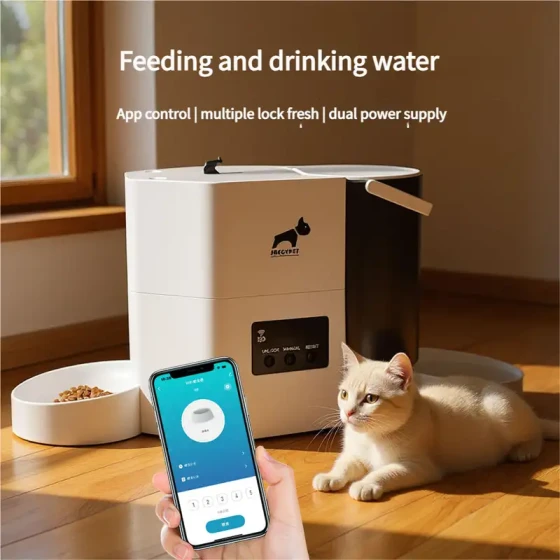Do pet cats need vaccinations_Complete guide to cat vaccination
Pet cats really do need vaccinations, that is, immunizations, which are key measures to protect cats' health and prevent infectious diseases. Just like we humans get vaccines when we were young, vaccinating cats effectively stimulates their immune system to produce antibodies, thereby resisting highly contagious and deadly diseases such as feline panleukopenia, feline viral rhinotracheitis, and feline calicivirus, building a strong health defense for them. Cats without vaccinations are like facing a viral army alone without armor, which is extremely risky.

Why must cats be vaccinated? The wisdom of "preventive action"
Cats, especially kittens, have almost no natural immunity to many common infectious diseases. These diseases often spread rapidly and once infected, treatment is not only expensive but has poor success rates, with many diseases even threatening life. Vaccination involves introducing a small amount of treated pathogens (or parts of them) into the cat's body, allowing their immune system to "rehearse" so that when facing the real pathogen, it can quickly identify and launch a counterattack. This is like installing a "virus identification and defense system" in advance for the cat, the best embodiment of "prevention is better than cure."
Even indoor "homebody cats" are not completely safe. Owners going out may bring viruses home, or cats' contact with the outside world (like looking out the window or brief outings) can result in virus infection. Therefore, whether indoor or outdoor, vaccines are a "shield" for cats' health.
What are the "main forces" of cat vaccines?
Currently, common cat vaccines in the market are mainly divided into core vaccines and non-core vaccines.
- Core vaccines: The "iron triangle" of cat health
Core vaccines are strongly recommended for all cats regardless of lifestyle or region because they target fatal diseases with high mortality and wide transmission. This usually refers to the commonly known "feline triple vaccine."- Feline panleukopenia virus (FPV): Also called feline infectious enteritis, it is the "number one killer" of cats. Symptoms include high fever, vomiting, diarrhea, dehydration, and drastic white blood cell decline. Mortality in infected kittens is extremely high, often striking unexpectedly.
- Feline calicivirus (FCV): Mainly causes upper respiratory infections in cats, such as runny nose, sneezing, oral ulcers, conjunctivitis, and in severe cases may lead to pneumonia or lameness.
- Feline herpesvirus (FHV-1): Also a common pathogen causing upper respiratory infections in cats, symptoms are similar to calicivirus, but often accompanied by eye symptoms such as conjunctivitis, keratitis, and can even cause blindness.
- Non-core vaccines: Flexible choices based on "cat's setting"
Non-core vaccines are selected based on the cat's living environment, exposure risk, and regional epidemic situation.- Rabies vaccine: Rabies is a deadly zoonotic disease that is almost untreatable once symptoms appear. While cats are less likely to contract rabies than dogs, in many cities, rabies vaccination is mandatory or strongly recommended for public safety and cat protection. Vaccination is especially important for cats that frequently go outside or have frequent contact with humans or other animals.
- Feline leukemia virus (FeLV) vaccine: This virus damages the cat's immune system, causing various secondary infections, anemia, and even tumors. Vaccination is recommended for cats that might contact other cats (e.g., multi-cat households, frequent outdoor exposure, or boarding).
- Feline infectious peritonitis (FIP) vaccine: This is a highly fatal disease, but the vaccine's effectiveness is still controversial and not suitable for all cats. Usually recommended only after a veterinarian assesses high risk.
Cat vaccination schedule: Grasp the "golden period"
Vaccination is not a one-time event but requires following a specific procedure. Below is a common cat vaccination schedule, but the exact plan should be tailored based on the cat's individual condition and veterinary advice:
- Kitten stage (2-4 months old): This is the "golden period" for vaccination.
- First feline triple vaccine dose: Usually given at 6-8 weeks old. At this time, maternal antibodies decrease and the kitten's own immunity begins to build.
- Second feline triple vaccine dose: Given 3-4 weeks later to boost immunity and ensure sufficient protective antibodies.
- Third feline triple vaccine dose (in some cases): Some kittens may not be fully protected after two doses, or vets may recommend a third dose considering the kitten's health and maternal antibody interference, usually 3-4 weeks after the second dose.
- Rabies vaccine: Usually given after 3 months of age (or later per vet's advice). It can be given alongside the last feline triple vaccine dose or separately.
- Adult cat stage (over 1 year old):
- Annual booster vaccinations: After completing the initial immunization series, cats generally need yearly boosters to maintain antibody levels. This includes the feline triple vaccine and rabies vaccine. Some newer vaccines or special cases may extend booster intervals to three years; please consult your vet.
Important reminders:
- Pre-vaccination health check: Cats must undergo a thorough health examination before vaccination to ensure no fever, diarrhea, cold, or other symptoms. Vaccinating sick cats may worsen the illness or affect immunity.
- Deworming first: It is recommended to deworm cats internally and externally before vaccination. Parasites weaken immunity and affect vaccine effectiveness.
- Avoid stress periods: Stressful events like moving, surgery, or environmental changes can affect the immune system. Vaccinations should be avoided during these times.
- Follow vet’s instructions: Vaccination procedures may vary by vaccine brand and individual cat conditions, so strictly follow professional veterinary guidance.
Post-vaccination "minor incidents" and responses
After vaccination, cats may show some mild reactions, which usually indicate the immune system is establishing protection and are nothing to worry about.
- Lethargy and reduced appetite: Cats may appear less active, sleepy, or have decreased appetite 1-2 days post-vaccination. This is similar to humans feeling "under the weather" after vaccination and usually resolves on its own.
- Swelling and pain at injection site: Local redness, swelling, and mild pain at the injection site are normal inflammatory responses, which can be relieved with ice packs and generally fade within a few days.
- Mild fever: Some cats may have a temporary low fever, with temperature rising less than 1°C, usually requiring no special treatment.
- Rare severe reactions: Although rare, some cats may have allergic reactions such as facial swelling, rapid breathing, vomiting, diarrhea, or even shock. Immediate veterinary care is required if these occur!
Friendly reminder: After vaccination, avoid intense exercise, bathing, keep cats warm, observe their mental state and appetite, maintain a quiet and comfortable environment for proper rest.
Common questions and answers
- Q: Can a kitten that hasn't completed all vaccines go outside?
A: Strongly not recommended! Before completing all basic vaccinations (usually the third feline triple dose or the rabies vaccine) and developing sufficient immunity, kittens are susceptible to infections. It’s best to wait at least one week after full vaccination before going outdoors. - Q: Adult cats that were never vaccinated, do they still need vaccines?
A: Absolutely! Adult cats also face risks of infectious diseases. For unvaccinated adults, vets will create a complete initial immunization plan based on health and risk assessment. This usually includes two feline triple vaccine doses spaced 3-4 weeks apart, followed by a rabies vaccine. - Q: Will a delayed vaccine cause problems?
A: A few days' delay usually does not cause issues. However, if delayed too long, restarting the whole immunization program or adjusting the vaccination plan per vet advice may be needed to ensure effective immunity. Try to vaccinate on schedule. - Q: Is it better to vaccinate more frequently?
A: Not necessarily. Over-vaccination may increase the risk of adverse effects and does not guarantee better protection. Vaccination should strictly follow veterinary advice and vaccine instructions. - Q: I've heard some cats develop tumors after vaccination, is that true?
A: In extremely rare cases, cats can develop vaccine-associated sarcomas (VAS) at injection sites, but this is a very uncommon complication. To minimize risk, vets typically inject in easily observed and managed areas like legs or tail, and newer vaccines offer improved safety. The benefits of vaccination greatly outweigh potential risks.
Conclusion: We cannot ignore the health of our cats
Vaccinating cats is an essential part of responsible pet care and a commitment every cat owner makes for their cat’s health. Though small challenges occur, like cats' resistance during shots or brief discomfort after vaccination, these are minor compared to the huge health protection vaccines provide.
Imagine your beloved cat playing happily at home, protected by vaccines and even safely exploring a small world. This peace and happiness are priceless. As the saying goes "spend a little to achieve a lot", regular cat vaccinations not only significantly reduce infectious disease risks but also save you from costly future treatments. More importantly, it lays a solid foundation for their longevity and quality of life. Let us protect our furry friends’ health together with science and love!
References:
- American Association of Feline Practitioners (AAFP) Vaccination Guidelines
- World Small Animal Veterinary Association (WSAVA) Vaccination Guidelines
- Relevant health popular science materials issued by well-known domestic pet hospitals and veterinary academic institutions.
-560x560.webp)


